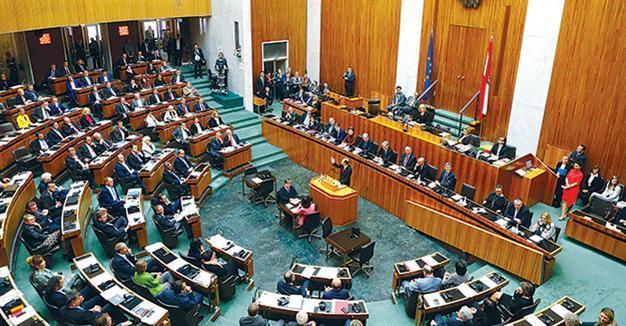UN chief slams ‘increasingly restrictive’ EU refugee policies, as Austria adopts tough new asylum law
VIENNA – Agence France-Presse

U.N. chief Ban Ki-moon hit out April 28 at what he called “increasingly restrictive” refugee policies in Europe as the continent faces its worst migrant crisis in decades, during a visit to Austria, whose parliament adopted one of Europe’s toughest asylum laws the previous day.
Ban also said he was “alarmed by the growing xenophobia here” and elsewhere in Europe, in a speech to the Austrian parliament.
“I am concerned that European countries are now adopting increasingly-restrictive immigration and refugee policies,” Ban told lawmakers.
“Such policies negatively affect the obligation of member states under international humanitarian law and European law. Divisiveness and marginalization hurt individuals and undermine security.”
His comments came one day after the Austrian parliament adopted one of Europe’s toughest asylum laws, as the country’s centrist government struggles to halt the surging far-right whose candidate won the first round of presidential polls on April 24.
The hotly-disputed bill, which passed by 98 votes to 67, allows the government to declare a “state of emergency” if migrant numbers suddenly rise and reject most asylum seekers directly at the border, including those from war-torn countries like Syria.
Under Austria’s new law, the government can now declare an emergency if the migrant flow threatens “national security.”
Border authorities will then only grant access to refugees facing safety threats in a neighboring transit country or whose relatives are already in Austria. Some groups including minors and pregnant women will be exempt from the rule.
The “special measures” will also force migrants to request asylum directly at the border in yet-to-be-built registration centers, where they may be held for up to 120 hours while their application is being checked.
Opposition parties and rights groups have slammed the legislation, with the U.N.’s refugee agency warning that it “removes a centerpiece of refugee protection.”
But Austrian Interior Minister Wolfgang Sobotka insisted Austria had no other choice as long as “so many other European Union members fail to do their part” to stop the influx.
“We cannot shoulder the whole world’s burden,” he said.
Wedged between Europe’s two main refugee routes - the Balkans and Italy - Austria received around 90,000 asylum requests in 2015, the second-highest in the bloc on a per capita basis.
More than a million people, primarily from Syria, Iraq and Afghanistan, landed in Europe last year, triggering the continent’s worst migration crisis since the aftermath of World War II.
The restrictions are similar to tough rules introduced by the right-wing government in neighboring Hungary last year.
In addition, MPs also voted to restrict existing asylum laws by placing limits on the length of asylum granted to migrants and making it harder for their families to join them.
“These are extremely dangerous tools that are being sharpened here, especially if they fall into the wrong hands,” said the leader of the small NEOS opposition party, Mathias Strolz.
Shortly before the vote, a group of protesters threw leaflets from the parliament’s upper gallery reading “Don’t walk over dead bodies, it won’t keep you afloat.”
The vote comes after the candidate of the far-right Freedom Party (FPÖ), Norbert Hofer, sent shock waves through the political establishment by winning the first round of the presidential election on April 24.
The two candidates of the ruling centrist coalition failed to even make it into the runoff on May 22.
 U.N. chief Ban Ki-moon hit out April 28 at what he called “increasingly restrictive” refugee policies in Europe as the continent faces its worst migrant crisis in decades, during a visit to Austria, whose parliament adopted one of Europe’s toughest asylum laws the previous day.
U.N. chief Ban Ki-moon hit out April 28 at what he called “increasingly restrictive” refugee policies in Europe as the continent faces its worst migrant crisis in decades, during a visit to Austria, whose parliament adopted one of Europe’s toughest asylum laws the previous day.